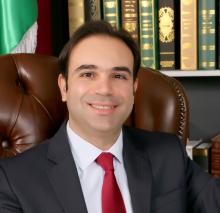You are here
2025 Budget: A heavy financial legacy and a realistic economic vision
Jan 11,2025 - Last updated at Jan 11,2025
The Parliament approved the 2025 budget with total expected spending of about JD14.3 billion (including the central budget and independent units). Expected revenues are around JD11.2 billion, leaving an overall deficit estimated at more than JD3 billion.
The most frequently asked question by the members of the parliament was whether the current budget shows a significant change in numbers compared to previous ones. The answer is definitely no. The budget carries a heavy burden inherited by the current government from its predecessors, represented by a large financial deficit that leads to an increase in public debt and, consequently, an increase in debt service payments, which account for about 17.5 per cent of total spending. Additionally, the weak economic growth rate of 2.2 per cent reduces the chances of increasing public revenues.
What sets this budget apart, despite all the constraints, are the changes made by the government. These include the strong realism with which the government approached each budget item, connecting the budget proposal (as much as possible) to the economic modernisation vision (EMV), and accurately translating the government’s statement into numbers reflected in the budget. This is a significant achievement for the government, reinforcing its commitment and credibility regarding the economic issues, especially considering that much of the budget was prepared when the government took office in September of the previous year.
What we mean by realism in the budget figures is that they are based on a reasonable and achievable growth rate for 2025 of about 2.5 per cent, without exaggeration or excessive optimism, knowing that the World Bank expects a growth rate of about 2.9 per cent. Of course, the economic growth rate is the basis for estimating public revenues, which in the proposal are aligned with the expected growth rate.
This certainly helps avoid what happened last year, where the expected revenues were about one billion dinars lower than the actual revenues!
In addition, the budget figures align with expectations for inflation rates of 2.2 per cent this year, export growth of about 0.7 per cent, imports at 4.1 per cent, and a projected current account deficit of approximately -4.6 per cent of GDP!
Through the budget, the government also made an effort to begin (even partially) the major initiatives and projects outlined in the (EMV), such as the National Carrier project and the railway project. It is true that, given the budget constraints, including a large deficit, high debt service, and weak growth rates, it is very challenging to allocate more than what has been set aside for modernisation projects.
However, simply including these projects in the implementation plan is a positive sign, with the emphasis that funding for modernization projects should be increased in next year’s budget.
The budget also aligns with the government’s statement, reflecting and translating the ideas in the statement into numbers that the government commits to, without exaggeration or overoptimism. This shows a realistic understanding of the current economic constraints in Jordan. One of the most important items that reflect this realism is the capital spending item, amounting to JD1.468 billion, which is about a 16 per cent increase compared to 2024 figures, most of which, in fact, were not capital expenditures in the economic sense. In addition, there has been an increase in self-reliance in the budget (the percentage of local revenues covering current spending), which will rise to about 86 per cent in the 2025 budget, while the expected grants as a percentage of total public spending will decrease to around 5.9 per cent, reinforcing the approach of self-reliance.
There is no doubt that MPs have the right to present the needs of their regions and the services and projects they lack, and I believe everyone understands this. The financial committee has made a significant effort, holding nearly a hundred meetings with ministries and public institutions over the past few weeks. However, it is also important to recognise that the government inherited a budget burdened by a challenging financial and economic legacy, where cosmetic policies had long overshadowed genuine remedial measures.
Raad Mahmoud Al-Tal is head of the Economics Department - University of Jordan













Add new comment